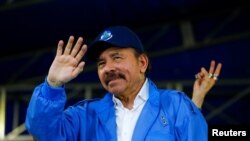Nicaragua said Tuesday that it has released all prisoners detained in relation to 2018 anti-government protests, though the opposition maintains that more than 80 people it considers political prisoners are still in custody.
President Daniel Ortega's government said in a statement that it has complied with a 90-day period for releasing such prisoners as part of negotiations this spring, a period that expired Tuesday.
According to the government statement, on March 27 an agreement was reached for the release of "people involved in the violent actions" during the protests, per a list that was reviewed by third parties.
It added that "all those people" are now free under a recently approved and controversial amnesty law, and under a commitment not to repeat their alleged offenses.
Leaders of the Civic Alliance opposition group met with Roman Catholic officials to discuss the situation and mostly avoided questions, though Mario Arana said the papal nuncio and the Organization of American States envoy would meet with relative of the prisoners.
The Union of Political Prisoners of Nicaragua announced that it would hold protests outside the Modelo prison north of the capital if they were not released by midnight.
The non-governmental Nicaraguan Human Rights Center issued a statement accusing the government of ``violating the commitments'' made in March.
Civic Alliance negotiator Carlos Tunnermann said earlier Tuesday that 84 prisoners were still behind bars, and they were not on the original list because they were arrested afterward.
The previous day he'd said more than 600 prisoners had been freed since February. The most recent group release of 56 people took place May 11 and included student and farm leaders.
Police deployed riot officers around a university where dozens of students held a meeting to demand the release of all the detained. Patrol cars were also sent to the offices of La Prensa, a newspaper critical of the government.
In her midday remarks, first lady and Vice President Rosario Murillo called the opposition "minuscule and microscopic groups who want to show a country that does not exist."
"They will not come back. ... In Nicaragua there is only room for love, peace and life," she said.
Murillo and other officials have frequently characterized government opponents as "terrorists" and coup-plotters.
Victor Hugo Tinoco, a former deputy foreign minister under Ortega who has broken with the ruling Sandinista party, accused the president of trying to appear like he is making concessions while failing to live up to agreements.
"Ortega is demonstrating that he does not intend to free all the prisoners nor have early elections," Tinoco said, referring to two key opposition demands.
The protests erupted in April 2018 over a planned social security overhaul and broadened to include demands for Ortega's exit and early elections.
At least 325 people died in a crackdown by security forces and armed, allied civilian groups, according to the Inter-American Commission on Human Rights. Over 2,000 were wounded, and tens of thousands fled the country into exile.




